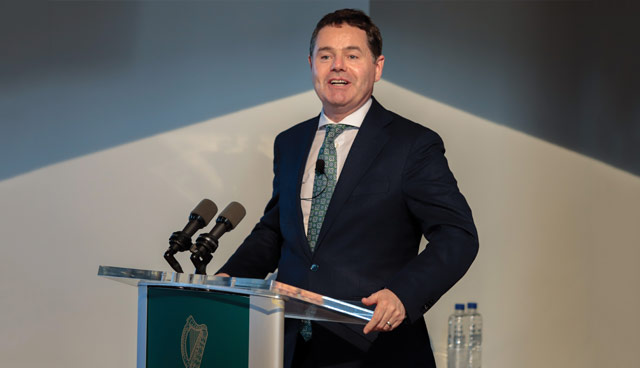Budget 2019


In October 2018, Minister for Finance and Public Expenditure and Reform Paschal Donohoe TD presented his second budget to the Dáil. Budget 2019, he said, “is a responsible budget for a modern and caring Ireland that aims to be at the centre of a changing world”. However, it has faced criticism. eolas reports.
Overheating
Optimal principles of fiscal management, the Parliamentary Budget Office (PBO) outlines, suggest that budgetary policy should be countercyclical. “This means supporting the economy through higher public spending when it is in recession and attempting to cool it down by increasing taxes and/or reducing spending if the economy is overheating,” it says. In the context of the Department’s forecast of a positive output gap from 2019, the likelihood of overheating has been upgraded from medium to high.
While the budget is consistent with fiscal rules, gross voted expenditure has increased by 7.8 per cent year-on-year and tax reductions total approximately €459 million. The PBO indicates that increasing spending so rapidly in the context of a risk of overheating “does not suggest that a countercyclical fiscal policy is being pursued”.
Pursuing a procyclical policy in terms of cutting taxes and increasing expenditure could feed into the potential for the economy to overheat. Simultaneously, the labour market is approaching full employment and the unemployment rate is expected to fall to 5.2 per cent in 2019. This growth in employment, alongside increased wages and low inflation, is expected to increase personal consumption by 3.5 per cent. While ‘muted’ in 2018 at 0.7 per cent, inflationary pressures are expected to emerge from 2019 (1.5 per cent) onwards.
Rainy Day Fund
The Rainy Day Fund, according to Minister Donohoe, has been established to “increase the State’s resilience to larger economic shocks”. This fund is to be capitalised with €1.5 billion from the Ireland Strategic Investment Fund and then supplemented annually with €500 million beginning in 2019.
Corporation tax revenue has been “growing strongly” and €0.7 billion of the overperformance in 2018 is expected to be a one-off. “Some of the historically high levels of corporation tax will be set aside for the purpose of capitalising the fund,” the Finance Minister indicates.
However, speaking with eolas Magazine, PBO Director Annette Connolly asserts: “A figure of €500 million was mentioned and it seems as if that is simply an arbitrary number, not actually based on a clear rationale. [The Department] hasn’t moved away from that €500 million and it doesn’t appear, at this stage, as if it really is a countercyclical fund.”
Tax base
GDP growth for 2018 is now forecast at 7.5 per cent, while for 2019 it is 4.2 per cent. These short-term forecasts are endorsed by the Irish Fiscal Advisory Council.
In turn, revenue forecasts are based on future economic growth, but, as mentioned, there are several headwinds which have the potential to seriously disrupt economic activity and reduce Exchequer revenue. In recommending Budget 2019 to the Dáil, Minister Donohoe acknowledged that the Government “must continue to maintain a broad and stable tax base”.
That being said, 91.9 per cent of the €72.1 billion of Exchequer revenue to be collected in 2019 comes from: income taxes (31.8 per cent); VAT (21 per cent); appropriations-in-aid (17.7 per cent); corporation tax (13.2 per cent); and excise duties (8.2 per cent).
As such, the sustainability of the revenue base is also a cause for concern for the PBO. “Sensible” fiscal policy dictates that the tax base should comprise more reliable and less volatile revenue streams. Corporation tax in particular is precariously concentrated on a small number of foreign multinationals, whose employees, in turn, contribute to 23.7 per cent of PAYE, USC and PSRI revenue.
In terms of broadening the tax base, the PBO suggests that the failure to increase carbon or fuel taxation, alongside an absence of changes to motor tax appears to be “a missed opportunity” to rebalance tax revenue and address the fiscal risk posed by missed EU renewables targets.
The PBO Director indicates: “[Budget 2019] looks fairly procyclical rather than countercyclical to us. There does seem to be an overreliance on corporation tax receipts, particularly for this year and even into the future.”
Brexit
Donohoe outlines that, through Budget 2019, the Government will: manage the public finances responsibly; provide significant additional capital investment; protect the most vulnerable in our society; and prepare the economy for the challenges of Brexit.
The possibility of a no deal Brexit, he maintains “influenced decisions” in relation to balancing the books and investing in infrastructure. Some measures he outlined include: a €300 million ‘Human Capital Initiative’; a ‘Future Growth Loan Scheme’ for SMEs; €110 million across several departments; and increased PEACE programme funding.
However, the macroeconomics underpinning Budget 2019 are predicated on an ‘orderly Brexit’. The PBO suggests that given the considerable uncertainty about the future relationship between the UK and the EU, “it may not be prudent” to plan on the basis of an ‘orderly’ Brexit.
The PBO Director is not convinced that Budget 2019 fully factored in domestic and global downside risks. “In turn, those economic growth forecasts are what would be used when the Department is forecasting revenue – the receipts from income taxes, VAT and so on – it is all predicated on a benign economic growth. Of course, the danger is that if that doesn’t happen, it could have a worse economic impact which will, in turn, impact on revenues. It does seem to us that there is a reliance and a dependence on corporation tax receipts. From that perspective, we thought that the Budget was not prudent,” Connolly says.
Revenue
Total voted expenditure in 2019 will be €66.6 billion. Of that, current expenditure will total €59.3 billion (a 4 per cent or €3.3 billion increase) while capital expenditure will amount to 7.3 billion (an increase of 24 per cent or €1.5 billion). The Government, the Minister explains, “has made the clear national choice in Project Ireland 2040 to prioritise increases in capital spending”.
As such, in 2018, the deficit, he said, will be reduced to 0.1 per cent (€315 million), while in 2019 he will balance the budget (with a small budget deficit of €75 million or 0.0 per cent of GDP).
Donohoe reiterates his intention to run surpluses beyond 2019 which will be utilised to reduce the national debt. This debt, he outlines, is the equivalent of €42,000 for every individual residing in the State. Standing at 111 per cent of GNI* in 2017, forecasts suggest that it will reduce to 105 per cent in 2018 and 101 per cent in 2019.
In the Summer Economic Statement, Donohoe had outlined that €3.4 billion of additional resources were available in 2019, €2.6 billion of which is pre-committed. This left €800 million to be allocated. While, it is acknowledged that Budget 2019 exceeded the €800 million that was available for budgetary measures, to supplement resource allocation in Budget 2019, the Minister announced €700 million of additional revenue raising measures.
However, the increase in net budget revenue only amounts to €350 million. This increase consists of €715 million through revenue-raising measures (e.g. the restoration of the 13.5 per cent VAT rate for tourism and hospitality) against revenue reductions of €365 million.
Almost annual overruns
The PBO is also concerned by the “almost annual and recurring use of supplementary estimates in respect of certain votes [which] means that the estimates provided in the budget may not be definitive”. In particular, this concern is focused upon the management, accountability and transparency of spending in the health and justice.
“A supplementary estimate of at least €700 million in voted current funding will be required for the health vote later this year,” it says. “This will effectively form part of the increase in the 2019 allocation.”
It is implied (as per the figures contained in the Expenditure Report 2019), that supplementary estimates totalling over €1.2 billion for 2018 are expected for the following votes:
- Health (€645 million);
- Education and Skills (€147 million);
- Housing, Planning and Local Government (€60 million);
- An Garda Síochána (€50 million);
- Transport, Tourism and Sport (€37.5 million); and
- Overseas aid (€17 million).
“On the one hand, you might say, that this is a recognition of the reality. But, on the other hand, from a purely expenditure management perspective, it must be asked if this looks like rewarding people who have not been managing their budgets effectively,” Connolly concludes.





